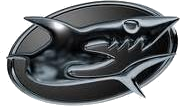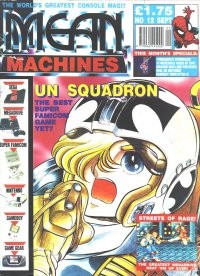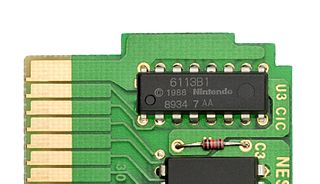
A handheld game console, or simply handheld console, is a small, portable self-contained video game console with a built-in screen, game controls and speakers. Handheld game consoles are smaller than home video game consoles and contain the console, screen, speakers, and controls in one unit, allowing people to carry them and play them at any time or place.

A video game console is an electronic device that outputs a video signal or image to display a video game that can be played with a game controller. These may be home consoles, which are generally placed in a permanent location connected to a television or other display devices and controlled with a separate game controller, or handheld consoles, which include their own display unit and controller functions built into the unit and which can be played anywhere. Hybrid consoles combine elements of both home and handheld consoles.
A regional lockout is a class of digital rights management preventing the use of a certain product or service, such as multimedia or a hardware device, outside a certain region or territory. A regional lockout may be enforced through physical means, through technological means such as detecting the user's IP address or using an identifying code, or through unintentional means introduced by devices only supporting certain regional technologies.
In video gaming, famiclone is a term used to refer to a hardware clone of the Nintendo Entertainment System (NES), known in Japan as the Family Computer or Famicom. They are designed to replicate the workings of, and play games designed for the NES and Famicom. Hundreds of unauthorized clones and unlicensed game copies have been made available since the height of the NES popularity in the late 1980s. The technology employed in such clones has evolved over the years: while the earliest clones feature a printed circuit board containing custom or third party integrated circuits (ICs), more recent (post-1996) clones utilize single-chip designs, with a custom ASIC which simulates the functionality of the original hardware, and often includes one or more on-board games. Most devices originate in China and Taiwan, and less commonly South Korea.
The history of video game consoles, both home and handheld, began in the 1970s. The first console that played games on a television set was the 1972 Magnavox Odyssey, first conceived by Ralph H. Baer in 1966. Handheld consoles originated from electro-mechanical games that used mechanical controls and light-emitting diodes (LED) as visual indicators. Handheld electronic games had replaced the mechanical controls with electronic and digital components, and with the introduction of Liquid-crystal display (LCD) to create video-like screens with programmable pixels, systems like the Microvision and the Game & Watch became the first handheld video game consoles.

GameShark is the brand name of a line of video game cheat cartridges and other products for a variety of console video game systems and Windows-based computers. Currently, the brand name is owned by Mad Catz, which marketed GameShark products for the Sony PlayStation, Xbox, and Nintendo game consoles. Players load cheat codes from GameShark discs or cartridges onto the console's internal or external memory, so that when the game is loaded, the selected cheats can be applied.

The iQue Player is a handheld TV game version of the Nintendo 64 console that was manufactured by iQue, a joint venture between Nintendo and Taiwanese-American scientist Wei Yen after China had banned the sale of home video games. Its Chinese name is Shén Yóu Ji (神游机), literally "God Gaming Machine". Shényóu (神游) is a double entendre as "to make a mental journey". It was never released in any English-speaking countries, but the name "iQue Player" appears in the instruction manual. The console and its controller are one unit, plugging directly into the television. A box accessory allows multiplayer gaming.

iQue, Ltd. is a Chinese video game/game localization and support development company located in Suzhou. It was founded as a joint venture between Wei Yen and Nintendo in 2002 as a Chinese video game console manufacturing company. The following year, the company released the iQue Player. The company had manufactured and distributed official Nintendo products for the mainland Chinese market under the iQue brand until 2018.
Import gamers are a subset of the video game player community that take part in the practice of playing video games from another region, usually from Japan where the majority of games for certain systems originate.

Mean Machines was a multi-format video game magazine published between 1990 and 1992 in the United Kingdom.

The video game industry in Mainland China currently is one of the major markets for the global video game industry, where more than half a billion people play video games. Revenues from China make up around 25% of nearly US$100 billion video game industry as of 2018, and since 2015 has exceeded the contribution to the global market from the United States. Because of its market size, China has been described as the "Games Industry Capital of the World" and is home to some of the largest video game companies. China has also been a major factor in the growth of esports, both in player talent and in revenue.

Söldner-X: Himmelsstürmer is a 2007 scrolling shooter video game developed by German company SideQuest Studios and published by Eastasiasoft. The game was initially released physically for Microsoft Windows on December 14, 2007, before coming to the PlayStation 3 via the PlayStation Network in December 2008.

The Nintendo Entertainment System (NES) is an 8-bit third-generation home video game console produced by Nintendo. It was first released in Japan in 1983 as the Family Computer (FC), commonly referred to as Famicom. It was redesigned to become the NES, which was released in American test markets on October 18, 1985, and was soon fully launched in North America and other regions.

The GP2X Wiz is a handheld game console and portable media player developed by South Korean company GamePark Holdings running a Linux kernel-based embedded operating system. It was released on May 12, 2009, and was also the first console from both Game Park and Game Park Holdings to be also released outside South Korea. It is the successor to the GP2X.

The Checking Integrated Circuit (CIC) is a lockout chip designed by Nintendo for the Nintendo Entertainment System (NES) video game console in 1985; the chip is part of a system known as 10NES, in which a key is used by the lock to both check if the game is authentic, and if the game is the same region as the console.
The eighth generation of video game consoles began in 2012, and consists of four home video game consoles: the Wii U released in 2012, the PlayStation 4 family in 2013, the Xbox One family in 2013, and the Nintendo Switch family in 2017.
The ninth generation of video game consoles began in November 2020 with the releases of Microsoft's Xbox Series X and Series S console family and Sony's PlayStation 5.

In the video game industry, the market for home video game consoles has frequently been segmented into generations, grouping consoles that are considered to have shared in a competitive marketspace. Since the first home consoles in 1972, there have been nine defined home console generations.










